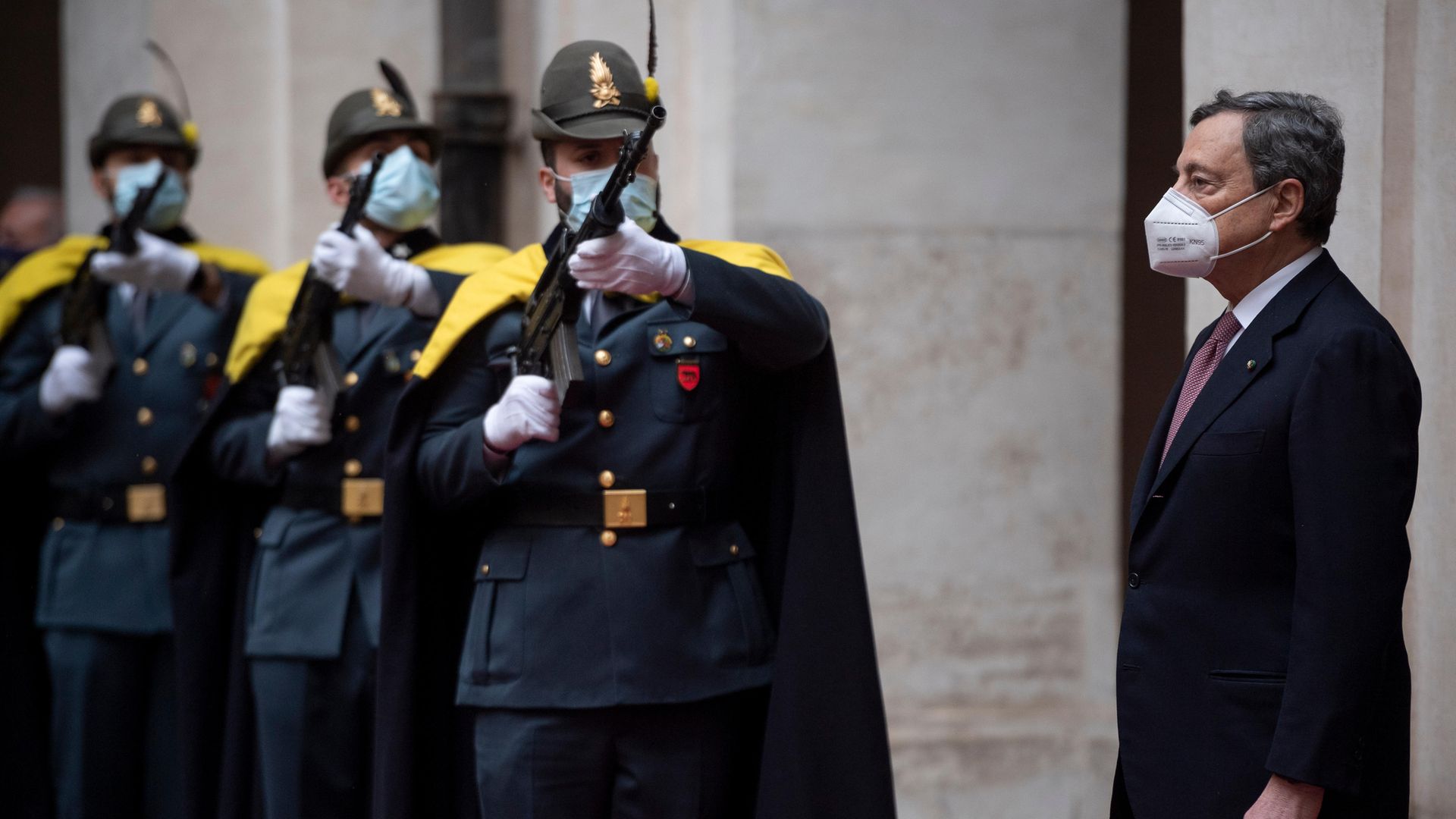
Lionel Barber, former editor of the Financial Times, on the task facing Mario Draghi, the man dragged out to rescue his country.
Late last autumn, Mario Draghi sat in his house in Umbria waiting, half in dread, for the inevitable call from Rome. Almost a year had passed since his departure as president of the European Central Bank. Universally acclaimed as the man who had saved the euro, Draghi had survived without visible blemish during four decades of public service. Aged 73, he had little appetite for being dragged into the snake-pit of Italian politics.
Yet Draghi was aware that his manoeuvre room was narrowing. Italian newspapers were full of trial balloons floating his name as the country’s next prime minister. He was said to be the best man – the only man – to lead a country ravaged by the coronavirus pandemic and political infighting. By the turn of this year, as the fractious coalition government led by the lawyer Giuseppe Conte teetered on the brink, Draghi concluded, reluctantly, that if the call came from Italy’s president Sergio Mattarella he would find it hard to resist.
The summons came on February 3. Rather than calling fresh elections, Mattarella turned to the technocrat who enjoys near mythical status in his home country. Draghi resolved that civic duty took precedence over his own personal reservations. On Saturday, he was sworn in as Italy’s prime minister heading a government of national unity comprising technocrats and politicians ranging from the right-wing Lega party to the formerly anti-establishment Five Star Movement.
His new government faces conditions viewed as the most challenging since the end of the Second World War, with sky-high debt, rising unemployment and an economy which shrank by 9% last year as a result of Covid-19. Given the scale of the challenge, the initial response to his appointment was unnervingly bullish.
“Draghi has a combination of gifts lacked by other Italian technocrats,” wrote Ferdinando Giugliano, Bloomberg economics commentator, “a deep understanding of his country’s and the eurozone’s economic problems, as well as courage and political smarts. This still might not be enough to fix Italy, but you won’t find a more qualified candidate – even if this is an unelected one.”
A master of managing expectations, especially in relation to financial markets, Draghi knows his time in office will likely be limited. Italy’s next elections are due by 2023. He must not only pick priorities, but also manage chronic political instability and an economy which has barely grown in real terms for the past two decades. What are his chances of success?
*****
Back in the mid-1990s, Mario Draghi occupied a modest office in the Italian treasury. Visitors encountered a man who was courteous and understated, speaking English fluently albeit with a native Roman accent. Nothing in his demeanour suggested he was a co-architect of the soon to be launched single European currency. As a key Italian negotiator, Draghi belonged to a handful of technocrats-turned-politicians (Carlo Azeglio Ciampi, Lamberto Dini and Romano Prodi) who helped secure highly-indebted Italy’s improbable entry into the euro, against the reservations of Germany’s economic establishment.
Fifteen years later, Draghi, having spent a spell at Goldman Sachs and as governor of the Bank of Italy, found himself in the running for the job of president of the European Central Bank. His credentials were impeccable, but his nationality counted against him. Everyone was aware of the Italian caricature: lavish spenders, fast cars, essentially unserious. But when Axel Weber, the German front-runner, dropped out of the race on the grounds of his opposition to the ECB’s activist bond buying programme, Draghi, supported by French president Nicolas Sarkozy, became the obvious choice.
Draghi’s tenure as ECB president is usually summed up in three words: whatever it takes. Uttered off-the-cuff in the summer of 2012 in the shadow of the Olympic Games in London, Draghi’s vow earned him the title “Super Mario”, the man who faced down financial markets and rescued the euro. It was indeed a dramatic move, one which wagered the balance sheet of the ECB against the speculators, signalling the beginning of the end of Europe’s sovereign debt crisis.
An accomplished economist, Draghi’s secret was combining technical prowess – the various ECB market interventions to stabilise government bond prices in the eurozone – with deft political maneuvering, especially in Berlin. On one occasion, chancellor Merkel, wary about the ECB’s unconventional monetary policy measures and a political backlash in Germany, told Draghi: “You have put a toad on my desk.”
In the end, Merkel swallowed the toad. Not just the ECB’s market interventions but also a huge rescue package for Greece, the catastrophically indebted “bad boy” of the eurozone. Merkel figured that it was more dangerous to let Greece crash out than sign up to an unpopular bail-out. From then on, Draghi continued to make the markets dance to his tune, transforming the ECB, in his words, into a modern day equivalent of the Federal Reserve in the US.
*****
The question is how far the skills which Draghi employed as a central banker can translate in his new overtly political role. Italy‘s fractured political landscape reflects divisions of society by ideology, class, religion (or the lack of it) and region. Coalitions have been the norm, with MPs swapping sides and governments relying on ‘transformed’ parliamentary majorities without recourse to elections. The country has now had 67 governments since the Second World War.
At times of crisis, Italy – via the country’s president whose constitutional role represents the higher national interest – has turned to technocrats. In 1993, after Italy’s ejection from the fixed exchange rate ERM (alongside the UK), Carlo Ciampi, former governor of the Bank of Italy, became prime minister (and later president). In 2011, Mario Monti, a former EU single market and competition commissioner, was drafted to succeed Silvio Berlusconi to push through austerity measures and structural reforms in return for EU aid.
The technocrats’ record is mixed. Ciampi abolished wage indexation to inflation and laid the groundwork for Italy’s re-entry into a reconstituted ERM, a precondition for euro membership. But in the 1994 elections Berlusconi’s populist Forza Italia swept to power. Monti fared reasonably well until he tried to become a real-time politician competing in elections. Draghi – photographed bumping elbows with Berlusconi last week – is too smart to make the same mistake. Besides, assuming he does not falter badly, Draghi is an obvious candidate to succeed Mattarella as president, a deus ex machina role perhaps more suited to his character.
The deeper problem, notes Lisa Zanotti, a scholar at the University of Diego Portales in Santiago, writing on the LSE blog, is that the Italian blend of populism and technocracy ignores the essential contentious nature of democratic politics. This is doubly difficult given the “tendency for political actors to support technocratic solutions while in opposition as a mechanism for depriving their opponents of access to power”.
For the moment, in the heat of the pandemic, it has suited politicians from hard right Matteo Salvini to ex-prime minister Matteo Renzi and the botoxed Berlusconi, as well as the Five Star Movement, to support Draghi. He has responded by giving them ministerial posts, while reserving the key economy job for Daniele Franco, an old colleague from the Bank of Italy. Two other appointments caught the eye: Vittorio Colao, ex head of Vodafone, for technology minister and Marta Cartabia, former president of Italy’s constitutional court, as justice minister, a critical portfolio.
The immediate priority is to access Italy’s share (200bn euros) of the EU’s giant recovery fund made up of grants and loans. Last summer’s ground-breaking economic rescue package allows for common EU borrowing on the bond markets, previously a German taboo. The catch is that the financial aid depends on member states implementing long delayed structural reforms, such as speeding up the judicial process, sharpening competition rules and reducing red tape.
“We have the extraordinary resources of the EU at our disposal,” said Draghi ahead of the formation of his new government, “we have the opportunity to operate with a careful eye on future generations.”
Playing the pro-EU card will feature regularly in Draghi’s playbook. Shocked by the Brexit referendum result, he has long been worried about the rise of Euroscepticism in Italy, embodied by Salvini’s anti-immigrant Lega party. In this context, Italy’s faltering vaccination campaign and the dangerously slow economic recovery are serious threats. Like other Italian officials, Draghi has been unimpressed by the European Commission’s mismanaged vaccine procurement effort.
Last year, Italy, along with Germany and France and the Netherlands, signed up for the Inclusive Vaccine Alliance but the quartet later agreed to give way in the cause of European solidarity. The new prime minister is sympathetic. But if delays persist, Draghi, an Anglophile who has noted the UK’s successful vaccination drive, could push for a revival of the Alliance or an ‘Italy First’ alternative of buying vaccines on the open market.
*****
Expectations for the new government are running high. On the positive side, financial markets have rewarded Draghi’s appointment with lower borrowing costs (which translates into higher government yields on Italy’s astronomic debt – 159% of GDP). Some go so far as to argue that his economic credibility will have far-reaching repercussions for the eurozone, tilting the balance away from German-style budgetary orthodoxy to more growth friendly policies.
Mujtaba Rahman, a top European analyst at the Eurasia Group consultancy, says Draghi’s presence in the European Council – this time as a politician rather than ECB president – “could enhance the legitimacy of fiscal transfers as well as the possibility that an (EU-wide) Recovery Fund is used again in future crises”.
This sounds fanciful. It is true that Draghi as ECB president became increasingly outspoken about the excessive reliance on monetary policy as opposed to fiscal policy in the management of the eurozone economy. But in his new role, he lacks the power or the mandate to push for a further leap toward deeper EU integration. For the moment, his priority must be domestic politics.
Draghi has many friends in high places around the world. All are willing him to succeed. But the constituency that matters is closer to home. The likes of Berlusconi, Renzi, Salvini are allies of convenience. They know it. So does Super Mario. The honeymoon will be sweet, but brief.
What do you think? Have your say on this and more by emailing letters@theneweuropean.co.uk










